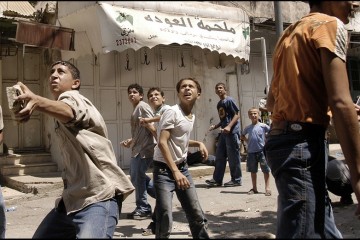
Academic Diary: Escalating violence in Israel, a view from Bethlehem
As I am sitting here writing this contribution at 8:50 in the morning, I can already hear signs of the relentless fighting that has been going on for over ten days around Rachel’s Tomb in Bethlehem: Soldiers shooting tear gas canisters, military jets are flying over the area, ambulances rushing to the scene and hundreds of impatient drivers waiting to cross the area honking without let-up. Riots had kicked off in the area in response to the current dispute between Israeli Jews and Arabs about the administration of the Temple Mount in Jerusalem. The Muslim religious site is administered by Jordan and Jews are allowed to visit but not to pray there. Increased Jewish visits in recent times have raised …
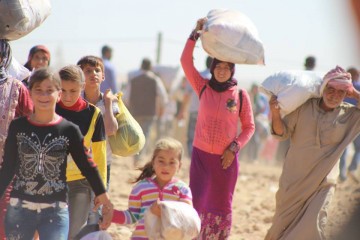
How likely is civil war in Turkey? More rights rather than borders could satisfy many Kurds
Is Turkey on the brink of civil war, given the recent violence against the country’s Kurdish population? How is this violence in Turkey related to broader events both in the Middle East and Europe? A major reason behind the recent violence in Turkey is that the Kurds experienced a recent political success in Turkey’s election in 2015: the pro-Kurdish Peoples’ Democratic Party (HDP) prevented President Erdogan from realising his dream to create an executive presidential system in Turkey, which would have implied taking more power from the parliament. At the same time, although Kurds have been immediate victims of the rise of ISIL in the region, they have also emerged as ISIL’s most potent military adversaries in the Kurdistan Region …
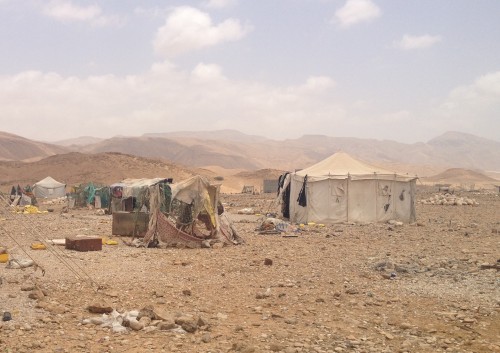
How does al-Qaeda attract Yemenis?
I recently wrote an article on the BBC website about the current situation in Yemen. As the recent experience of several Middle Eastern countries has shown, when governments break down, terrorist groups flourish. Yemen is the latest casualty. The unraveling of Yemen’s government and subsequent civil war has only increased the operational reach of al-Qaeda. A Saudi-led coalition, backed by the US and UK, is currently conducting air strikes against Yemen’s Houthi-led rebels. The latter swept into Yemen’s capital last September and consolidated their grip on power earlier this year assisted by former president Ali Abdullah Saleh, who maintained control of much of Yemen’s military apparatus. Ironically, this international military campaign is playing into al-Qaeda’s hands in several ways: by targeting al-Qaeda’s own domestic enemies; by employing sectarian rhetoric that plays up Sunni-Shi’ite fault lines previously insignificant in Yemen; by destroying Yemen’s military hardware that had been used against al-Qaeda; and by enabling al-Qaeda to exploit the lawless war-torn environment to expand its influence and build alliances among southern and eastern tribes to combat the mutual Houthi foe.

Netanyahu and the two-state solution
Israel’s international image has suffered tremendously in the past few years. Repeated wars in the Gaza Strip, the continued construction of housing units in Jerusalem and the West Bank, and Benjamin Netanyahu’s provocative rhetoric during his most recent bid to win re-election have poisoned the relationship between Israel and the international community. 2014 proved to be the year of Palestinian statehood recognition votes in Europe. Parliaments from Portugal to Ireland, all the way to the European Parliament in Brussels have considered recognition. Though cautiously worded, the motions indicate a change in the international mood surrounding the Middle East conflict. Netanyahu’s most recent declarations of support for the two-state solution reflect the deep concern that has spread in Israel regarding what is for the first time serious international pressure on the country. But does this necessarily translate into a bright future for the Peace Process?
Netanyahu’s interest in a two-state as opposed to a one-state solution should not take us by surprise. The latter would mean an Arab majority in the would-be Jewish state. At this time, about six million Jews and six million Arabs inhabit the territories of Israel and the future Palestinian state. With a higher Arab fertility rate, Jews would soon be a minority in such a state. Moreover, Palestinians seek the right of return of their over five million refugees as part of the state-creating deal, and it is to be expected that the state would attract a greater number of Palestinian refugees than of Jews eligible to return to Israel. It follows that a one-state solution spells the unthinkable for Israel.
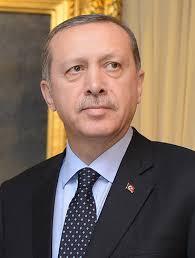
The perils of Turkish presidentialism
With Recep Tayyip Erdoğan sworn in as Turkey’s first popularly elected president last August, the debates on adopting a presidential system have once again come to the forefront in the run-up to the Turkish general election in June. The most important implication of the election will be whether it will lead to a formal move toward presidentialism in Turkey’s constitution.
Prior to the election, Turkey’s political system was admittedly complex. In 2007, Abdullah Gül, Erdoğan’s predecessor, was the last to be elected under the former system, in which parliament elected the president. He took office following a strained process between the Justice and Development Party (AKP), the Turkish Armed Forces, and the Republican People’s Party (CHP). The first presidential election in April was boycotted by the CHP. The Chief of the General Staff of the army made statements expressing the wish for a sincerely secular president, and published an e-memorandum warning against emerging disputes regarding the secular nature of the Turkish republic in the context of the election. Eventually, the AKP called an early general election in July, after which the presidential election was re-held in August.
As a further response to the crisis, the AKP held a referendum in October, ensuring the popular election of the president. Thus, Turkey remained a parliamentary system with a ceremonial president until the first popular presidential election was held, and Erdoğan was elected last year. Now, the system has become semi-presidential with both a popularly elected president and a prime minister responsible to the legislature. Crucially, the president does not hold substantial executive powers.
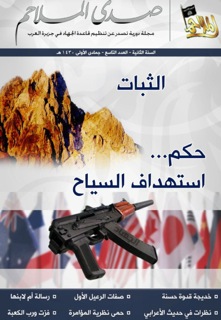
Oxford’s Elisabeth Kendall on Jihadism and the use of poetry
What is it that turns peace-loving Muslims into militant Islamists? There are many answers to this complex question. One angle that might not naturally spring to mind is poetry. Yet this is what Dr Elisabeth Kendall argues in an interview for BBC Radio 4’s “The World This Weekend” with Mark Mardell.

The push and pull of the world’s most dangerous migration route – what’s really behind the flock of thousands to Europe these days?
The Mediterranean Sea is today’s most dangerous border between countries not at war with each other. Just last week, 300 persons departing Libya on four rubber dinghies have gone missing at sea, after drifting for days without food and water. News reports in the past six months have regularly commented upon the rising number of persons disembarking on Italy’s coastline – benefiting from its search and rescue operation Mare Nostrum. Despite the increase in new arrivals from 33,000 to 200,000, the life-saving mission has now been discarded. Italian policy makers believe Mare Nostrum is as responsible for overcrowded reception centres as it is for the rising number of persons risking their lives at sea. But is it truly to blame for the surge? Because more than 50 per cent of arrivals are either Syrian or Eritrean, news commentators have provided some other potential explanations. Some point to the protracted conflict in the Middle East, whilst others highlight the strain on neighbouring Jordan, Lebanon and Iraq in continuing to receive thousands of Syrian refugees. “Poverty in Africa” is mentioned occasionally, and for the better informed, an oppressive military regime and indefinite conscription in Eritrea are to blame. Yet these supposed ‘causes’ of the latest wave in irregular migration to Europe are speculative at most and have in fact been ongoing for many years now.
The irregular and mixed movement of persons across borders is arguably the most pressing international issue of our time, second perhaps only to terrorism. Yet the response of nations is too often reactionary and punitive towards individuals making the move, causing policies like Mare Nostrum to be cut short. By pinpointing the multiple ‘Push’ and ‘Pull’ factors at play in the regions concerned it is possible to generate fresh insight on the debate on South- North migration.
‘Push Factors’
For Syrians and Eritreans on the move, the situation at home is the key reason for flight. In Syria, there are immediate threats to life, regardless of which side of the conflict you are on. In Eritrea, an oppressive military regime and a lifeless economy force several thousand to walk across its land borders every month. Ruthless and indiscriminate conscription waves can also augment departures, as can changes in border surveillance, including the reported end to the notorious ‘shoot to kill’ policy.
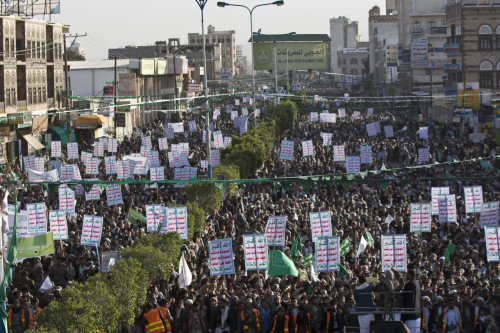
Transition and unease in the Arabian peninsula: a radio interview
Yemen continues to lurch from crisis to crisis. Last September, Houthi rebels (Zaydi Shi’ites from Yemen’s north) overran the capital Sana’a and have continued their push for geographical and political domination. After kidnapping the Yemeni President’s Chief of Staff on 19 January, in the following days they went on to besiege the Presidential Palace and demand changes to Yemen’s new draft constitution. Following failed attempts to implement a power-sharing agreement, on 22 January Yemen’s President, Prime Minister and Cabinet all resigned, stating that “we don’t want to be party to what is going on and what is going to happen”. That same day, Saudi Arabia’s King Abdullah died. While the Saudi transition appears smooth and promises continuity, where is the Arabian Peninsula heading?









